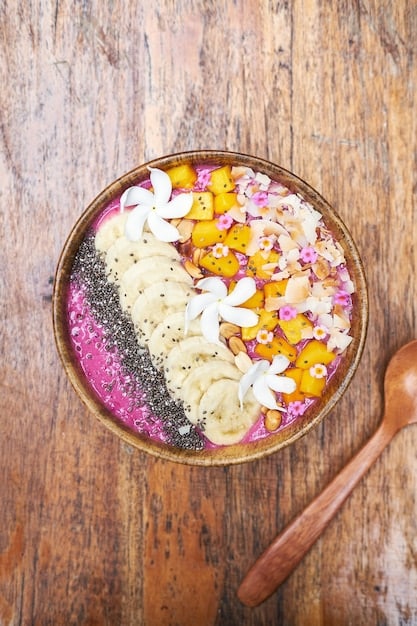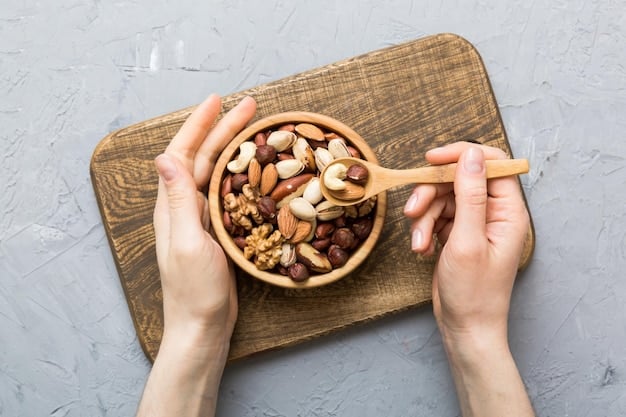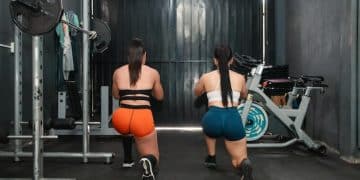Fuel Your Workouts: Top Pre-Workout Foods for Energy

Fueling your workouts with the right pre-workout foods can significantly enhance your energy levels, endurance, and overall performance, setting the stage for a more effective and satisfying fitness routine.
Do you want to optimize your workout performance? The secret might not just be in your training regimen, but also in what you eat beforehand. Fuel Your Workouts: The Best Pre-Workout Foods for Sustained Energy will guide you towards making the best choices.
Understanding the Importance of Pre-Workout Nutrition
Before diving into specific food choices, it’s crucial to understand why pre-workout nutrition is so important. Think of your body like a car; it needs fuel to run efficiently.
The food you consume before a workout provides this fuel, affecting everything from your energy levels to your muscle endurance. Let’s explore why this is the foundation for your fitness success.
Why Fueling Matters
Proper pre-workout nutrition offers several benefits:
- Sustained Energy: Prevents energy crashes during your workout.
- Improved Performance: Enhances strength and endurance.
- Muscle Protection: Helps minimize muscle breakdown.
- Faster Recovery: Initiates the recovery process immediately after exercise.
In essence, pre-workout nutrition preps your body to perform at its best, enabling you to push harder, last longer, and recover more quickly.
Pre-workout nutrition is not just about eating *something* before you exercise; it’s about making smart choices that support your fitness goals.
Carbohydrates: The Body’s Preferred Energy Source
Carbohydrates are the body’s primary source of energy, making them essential for pre-workout fuel. They are broken down into glucose, which your muscles use as energy during exercise.
However, not all carbs are created equal. The type of carbohydrates you consume can significantly impact your workout performance.
Simple vs. Complex Carbs
When choosing carbs, consider the difference between simple and complex options:
- Simple Carbohydrates: Provide a quick burst of energy, ideal for short, intense workouts.
- Complex Carbohydrates: Offer a sustained release of energy, better for longer endurance activities.
Timing also matters. Simple carbs are beneficial closer to your workout, while complex carbs should be consumed a few hours beforehand for prolonged energy.
The right balance of carbohydrates ensures you have the energy needed for your workout without experiencing energy spikes and crashes.
Protein: Supporting Muscle Function and Growth
While carbohydrates provide the primary fuel, protein plays a crucial role in supporting muscle function and growth. It helps prevent muscle breakdown during exercise and contributes to muscle repair post-workout.
Including a moderate amount of protein in your pre-workout meal can significantly benefit your fitness journey. Let’s look at how protein helps maintain muscle mass and improve performance.
Protein’s Role in Workouts
Here’s how protein supports your fitness efforts:
- Muscle Preservation: Minimizes muscle breakdown during intense exercise.
- Enhanced Performance: Improves muscle function and power output.
- Faster Recovery: Aids in muscle repair and growth.
Combining protein with carbohydrates can also stabilize blood sugar levels, providing a more consistent energy supply throughout your workout.
Protein is the building block of muscle, making it an indispensable component of pre-workout nutrition.

Healthy Fats: Sustained Energy and Hormone Support
Healthy fats are often overlooked in pre-workout nutrition, but they provide sustained energy and support hormone production, which is vital for muscle growth and overall health.
While fats take longer to digest than carbs, they offer a steady energy source that helps you power through longer workouts. The key is to choose the right types and consume them in moderation.
Incorporating Healthy Fats
Here’s how to incorporate healthy fats into your pre-workout routine:
- Choose Wisely: Opt for sources like nuts, seeds, and avocados.
- Moderate Portions: Avoid overconsumption to prevent digestive discomfort.
- Time Properly: Consume fats at least 2-3 hours before your workout for optimal digestion.
Healthy fats contribute to overall energy balance and hormonal health, enhancing the effectiveness of your workouts.
Incorporating healthy fats into your pre-workout regimen ensures sustained energy and supports critical bodily functions.
Top Pre-Workout Food Choices
Now that we’ve covered the three macronutrients, let’s dive into specific food choices that make excellent pre-workout snacks or meals. These options provide the perfect blend of carbs, protein, and fats to fuel your workouts effectively.
These foods are easy to digest, nutrient-dense, and provide the energy you need to perform at your best. Here are some great options to consider.
Excellent Choices for Energy
Here are some of the top choices for pre-workout fuel:
- Oatmeal: Provides slow-releasing carbohydrates for sustained energy.
- Banana: Offers quick energy from simple sugars and potassium for muscle function.
- Greek Yogurt with Berries: Combines protein and carbohydrates for a balanced boost.
- Nuts and Seeds: Delivers healthy fats for sustained energy and hormone support.
- Whole Grain Toast with Avocado: Offers complex carbs and healthy fats for prolonged energy.
These options are not only nutritious but also easily customizable to suit your preferences and dietary needs.
Choosing the right foods can make a significant difference in your energy levels and workout performance.
Timing Your Pre-Workout Meal
The timing of your pre-workout meal is just as important as the food choices themselves. Eating too close to your workout can cause digestive discomfort, while eating too far in advance may leave you feeling sluggish.
Finding the right balance ensures you have enough energy without experiencing any negative side effects on your performance. Understanding the ideal timing can enhance your workout results.

Optimal Timing Strategies
Here are some timing strategies to consider:
- Large Meal: Eat 2-3 hours before your workout to allow for proper digestion.
- Small Snack: Consume 30-60 minutes before your workout for a quick energy boost.
Adjust the timing based on your individual tolerance and the intensity of your workout. Pay attention to how different meal timings affect your energy levels.
Proper timing ensures that your body has the fuel it needs without causing digestive issues during your workout.
Hydration: Don’t Forget the Water
While pre-workout nutrition often focuses on food, hydration is equally important. Dehydration can lead to fatigue, muscle cramps, and decreased performance.
Ensuring you’re adequately hydrated before, during, and after your workout is crucial for optimal results. Let’s look at why staying hydrated is vital for your fitness routine.
The Role of Hydration
Here’s why staying hydrated is essential:
- Performance: Maintains blood volume and ensures efficient nutrient delivery.
- Temperature Regulation: Helps regulate body temperature and prevents overheating.
- Muscle Function: Prevents muscle cramps and supports muscle contractions.
Drinking enough water is a simple yet effective way to improve your workout performance and overall health.
Proper hydration is a cornerstone of effective pre-workout preparation. It supports performance, regulates body temperature, and helps prevent muscle cramps.
| Key Point | Brief Description |
|---|---|
| 💪 Carbs | Primary energy source, choose simple for quick bursts and complex for sustained energy. |
| 🥩 Protein | Supports muscle function and growth, prevents muscle breakdown. |
| 🥑 Healthy Fats | Provides sustained energy and supports hormone production. |
| 💧 Hydration | Maintains performance, regulates temperature, and prevents cramps. |
Frequently Asked Questions (FAQ)
What are the best pre-workout foods?
▼
Great pre-workout foods include oatmeal, bananas, Greek yogurt with berries, nuts and seeds, and whole-grain toast with avocado, providing a mix of carbs, protein, and healthy fats for sustained energy.
▼
For a large meal, eat 2-3 hours before your workout. For a small snack, consume it 30-60 minutes before. Adjust the timing based on your individual tolerance and workout intensity.
▼
Focus on carbohydrates for energy, but don’t neglect protein to support muscle function and prevent breakdown. A balanced mix of both is ideal for optimal performance.
▼
Yes, but choose healthy fats and consume them in moderation at least 2-3 hours before your workout. They provide sustained energy and support hormone production.
▼
Hydration is crucial for maintaining blood volume, regulating body temperature, and preventing muscle cramps. Drink plenty of water before, during, and after your workout for best results.
Conclusion
In conclusion, fueling your workouts with the right pre-workout foods is essential for enhancing your energy, improving performance, and supporting muscle function. By understanding the roles of carbohydrates, protein, and healthy fats, and by timing your meals appropriately, you can optimize your fitness routine and achieve your goals more effectively. Remember to also stay hydrated and choose foods that work best for your individual needs and preferences.





